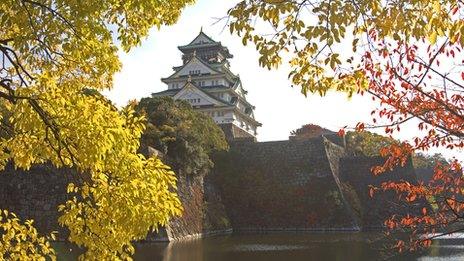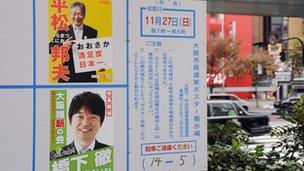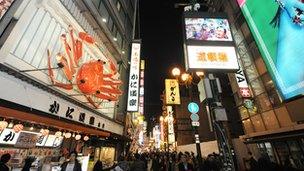Gangster son takes on conservative Osaka mayor
- Published

The Siege of Osaka: Local media draws parallels with 17th century battles at the castle as two candidates slug it out in the mayoral election
Sex and gambling don't usually win votes in election campaigns.
But a self-proclaimed son of a gangster is proposing just that as a way to boost the economy in Osaka's mayoral election.
Toru Hashimoto is a 42-year-old lawyer-turned-politician who is running against incumbent Kunio Hiramatsu.
With a population of 8.8 million, Osaka is Japan's third largest prefecture.
It is a city of merchants, known for its salty dialect which many Osakans proudly verbalise even if they leave their hometown.
But for Mr Hashimoto, it is a sin city.
"There is no other city as vulgar and obscene as Osaka," says Mr Hashimoto.
"We should celebrate the image and welcome the development of casinos and red-light districts to attract people."
Back-up capital
His plans do not stop there.
He recently resigned from the Osaka prefectural governor's post to run for the mayor of the city of Osaka; located in the centre of the prefecture.
Why? Because he wants to get rid of the position.
"We need to reform the administrative structure completely," Mr Hashimoto tells voters who gather to listen to him speak.

Kunio Hiramatsu (top) vs Toru Hashimoto (bottom)
"I will merge the city and the prefecture, because there's so much overlap in what those civil servants do," he exclaims.
His goal is to make Osaka the back-up capital city of the nation.
The Kansai region, which includes Osaka, Kyoto and Nara, was Japan's capital city for the longest period in Japan's history, so the idea has been floated before.
In 2005, 362 members of parliament formed a federation to study how and where to build an emergency capital city.
But since the 11 March earthquake, there has been a renewed urgency to do so.
"Japan would lose its function as a state if Tokyo gets struck by a big earthquake," says the federation's chairman Hajime Ishii in his blog.
Hashism vs established parties
Mr Hashimoto's competition, Kunio Hiramatsu, is against such radical changes.
The 63-year-old popular former news reader was elected in 2007.
"Hashimoto's Osaka plan is a one-way bus ticket to an unknown location with unfamiliar stops along the way. We have to stop it," says Mr Hiramatsu.
"He wants to change the system so that he can be in charge of Osaka's political power and assets."
"His purpose is to dictate and to loot," he adds.
Mr Hiramatsu is supported by the prefectural chapters of the ruling Democratic Party of Japan and the major opposition Liberal Democratic Party.

Lawmakers discuss whether to build a back-up capital in Osaka
The Japanese Communist Party withdrew its candidate and called on supporters to cast their ballots for Mr Hiramatsu.
"It is quite unusual for the Communist Party to back the same candidate as the DPJ and the LDP," says Koichi Nakano, Associate Professor of Political Science at Sophia University.
"Established parties are calling Mr Hashimoto's campaign Hashism - just like fascism - and they are determined to stop him," he adds.
The move, however, has made many voters wary.
"It feels like big political parties versus a passionate individual," says 74-year-old retiree Sachio Ogino.
Dr Ogino worked for the city for more than 40 years until his retirement and he supports Mr Hashimoto's view on the merger.
"I have personally witnessed an incredible amount of inefficiency in the city of Osaka," he says.
"I think Osaka needs someone like Mr Hashimoto to get the local economy back on its feet."
Personal attack
At the national level too, this election is also attracting more attention than usual due to Mr Hashimoto's background.
He was a controversial TV commentator of a popular programme before he became the youngest governor in Japan's history.
"Mr Hashimoto uses mass media well and he has portrayed himself as someone who is different from hereditary politicians," says Professor Nakano.
About 30% of elected members of parliament are second, third, or fourth generation politicians.
But not only is Mr Hashimoto not from a political family, his biological father was a mafia member.
"I've known that my father was related to the mafia," says Mr Hashimoto. "I only found out that he was an official member because of media coverage."
"You cannot expect a scion of a wealthy family to shake things up," adds Mr Hashimoto, shrugging off extensive media coverage about his father, who died when he was six.
Political candidates' family background is usually protected by the privacy law but according to local media he was raised by his biological mother and step-father.
And voters do not seem to mind because he admitted it so honestly.
"He's cute, he's smart and he's funny. So what if his dad was a bit naughty," Osaka resident Toyoe Yamamoto laughs.
Tortoise and Hare
And it is not his father's association with the mafia that is in the minds of voters; it is the economy.
"I would actually hate to see the city of Osaka and the prefecture merge," Mrs Yamamoto says, disagreeing with the core of Mr Hashimoto's campaign.
"But our economy is in such a bad shape, it might be what Osaka needs," she adds.
In a recent study by Hosei University, residents have ranked Osaka as the unhappiest place in the country due to a high crime rate and its struggling economy.
Voters want someone who can rescue the economy and create more jobs.
"Mr Hashimoto has always been good at creating a sensation," says Professor Nakano.
"The big question is whether voters think his measures are realistic."
Mr Hiramatsu describes himself as the Tortoise and Mr Hashimoto as the Hare in terms of the speed of their reforms.
"But, however slowly, I am confident that I have made Osaka a better city over the last four years," he adds.
There is no doubt that both candidates know the importance of kick-starting economic growth again.
Both have been assuring the voters that their plan is the one that will do that.
For the residents, the choice is between radical risky change and a conservative approach.
Correction 29 November 2011: We have amended our story to clarify details about Mr Hashimoto's family background